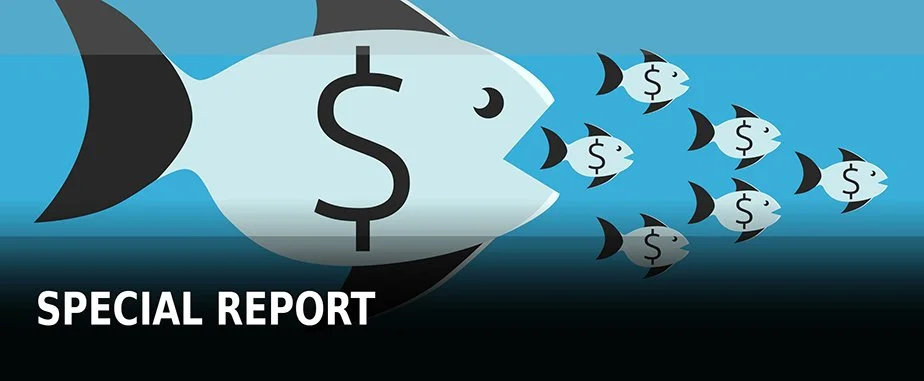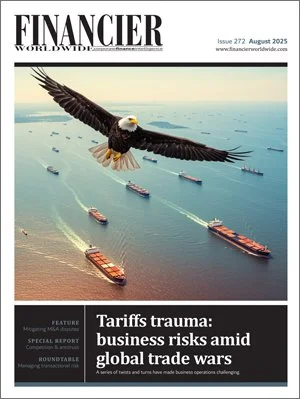Legitimate cooperation vs anticompetitive agreements – ‘Green Deal’ or ‘Green Cartel’?
August 2025 | SPECIAL REPORT: COMPETITION & ANTITRUST
Financier Worldwide Magazine
In many areas of the world. greenhouse gas emissions and other aspects of the environmental impact of economic activity have become widely recognised issues and receive considerable attention. Sustainability considerations play an increasingly important role in many policy areas and in public rulemaking. For example, the European Green Deal, announced in 2019, is the European Commission’s comprehensive strategy to make the EU climate-neutral by 2050. Similarly, sustainability has become a topic that companies cannot ignore. Capital market investors are placing increasing emphasis on sustainability criteria in their investment decisions. Finally, consumers are highly conscious of the social and ecological impact their purchasing decisions bring about. These developments are creating considerable incentives for companies to align their economic activities with sustainability and other public policy goals beyond the statutory requirements. Sustainability aspects have become parameters of competition along with price, quality and availability, which is bringing them into the realm of competition law and regulation.
There are, in principle, two ways of looking at sustainability from a competition law perspective. First, much of the recent discussion has revolved around how competition law can be applied in a manner that enables socially desirable cooperation to promote sustainability goals, including initiatives among competitors, for example to tackle market failure. Second, since the sustainability features of products and services are parameters of competition, they can be restricted through private agreements or concerted practices, including information exchange. In this article, we explore the fine line between legitimate cooperation and cartel conduct and discuss what companies can do to stay on the safe side.
Environmental protection agreements are not new
The idea that protecting the environment can serve as a justification for cooperation among competitors potentially restricting competition is not new. For example, in 1999 the European Commission (EC) exempted a sustainability initiative between washing machine producers from anticompetitive agreement prohibition that led to higher prices but lower energy consumption and, thus, indirectly to less pollution from electricity production. The agreement contained severe restrictions on competition, including prohibiting production and import of washing machines in certain energy efficiency categories. Nonetheless, the EC considered the restraints justified because individual consumers could recoup the higher prices through lower energy costs and because society would benefit from less environmental pollution. Similar arrangements were tolerated in other sectors. While the decision is well reasoned, it is still conceivable that in a different enforcement environment the inherently uncertain impact of the agreement and its most severe restrictions could be assessed differently.
General guidance by competition authorities on sustainability arguments
In its 2022 guidelines on horizontal cooperation, the EC provided guidance on its future practice of applying article 101 of the Treaty on the Functioning of the European Union to sustainability initiatives. While the guidelines note the potential benefits of sustainability initiatives, they express the view that competition (rather than its exclusion) will lead to innovation, quality and choice, and efficient allocation of resources. Accordingly, sustainability agreements meant to cover up price fixing or market or customer allocation continue to be restrictions by object. Discriminatory or non-inclusive agreements, as well as standards that foreclose innovation or cooperation, leading to an unnecessary exchange of commercially sensitive information, can be anticompetitive.
The EC is not alone in its efforts to adapt competition law to the challenges of the 21st century. Within the EU and across the globe, other competition authorities such as the Dutch Authority for Consumers and Markets, the UK’s Competition and Markets Authority (CMA) and the Japan Fair Trade Commission (JFTC) have expressed their priorities when enforcing competition law on sustainability agreements between competitors. In its informal Green Agreements Guidance, the CMA broadens exemptions for certain agreements and offers companies guidance on questions about specific agreements. The JFTC’s guidelines cover a wide range of sustainability topics and have only recently been updated to reflect the authority’s evolving practice. Some EU member states even amended their competition laws with sustainability exemptions (such as Austria in 2021) or – in the case of Germany – plan to add specific language to their laws.
Competition law enforcement in cases of sustainability cartels – the cases
While the primary impetus of the Green Deal rhetoric is to enable cooperation, this is not the only dimension. The environmental impact of economic activity has become both a political issue companies need to manage and a dimension in competition.
Not every initiative concerning sustainability is beneficial. Certain agreements can be harmful and may constitute an illegal cartel. When businesses coordinate on environmental or other sustainability aspects that influence competition, there is no justification for treating this more leniently than cooperation within any other parameters of competition. In July 2021, the EC fined five German car manufacturers for colluding to limit competition on the use of emission cleaning technology for new diesel cars. Although they possessed the technology to exceed legal requirements, the companies agreed not to compete on this basis, instead coordinating on AdBlue tank sizes and consumption estimates, and exchanging sensitive commercial information. Shortly afterward, the French Competition Authority (ADLC) investigated companies for withholding information from consumers about bisphenol A (BPA) in food containers. The ADLC fined 11 companies and four professional organisations for agreeing not to disclose the presence or composition of BPA or its substitutes, and for discouraging the supply of BPA-free cans before a legal ban forced them to do so, thereby restricting consumer choice and preventing competition based on the quality of food containers.
In several other cases, sustainability aspects were excluded as a parameter of competition between companies, thereby constituting an infringement of competition law. In 2017, the ADLC fined the three leading manufacturers of PVC and linoleum floor coverings, as well as their trade association, for engaging in three types of anticompetitive conduct. Notably, the companies and the association entered a non-compete agreement that prohibited each manufacturer from individually communicating about the environmental performance of their products, thereby restricting competition on this important aspect. In April 2025, the EC fined 15 major car manufacturers and a trade association for participating in a cartel concerning the recycling of end-of-life vehicles. Among other things, the companies had agreed not to promote how much of an end of life vehicle can be recycled, recovered and reused and how much recycled material is used in new cars. According to the EC, their goal was to prevent consumers from considering recycling information when choosing a car, which could lower the pressure on companies to go beyond legal requirements. Notably, the CMA fined the companies for the same infringement in parallel and closely coordinated proceedings under UK competition law.
Furthermore, there may be situations in which a well-intentioned collaboration nevertheless results in a cartel agreement if certain boundaries are crossed. Imagine a perfectly legitimate joint effort within an industry association to develop methodologies to measure the environmental impact of its members’ products. But then it is also agreed to exclusively use this methodology and not to use such values in marketing and advertising. Sustainability considerations can also play a role in unilateral conduct abusing market dominance. For example, the EC has informed Greek electricity provider Public Power Corporation (PPC) of its preliminary view that PPC abused its dominant position by selling electricity below cost on the Greek wholesale market between 2013 and 2019, thereby driving out competitors and hindering investment in cleaner energy sources. This conduct might have led to higher prices for Greek consumers and increased local emissions, undermining both market liberalisation and environmental goals.
How companies can manage new compliance risks
Companies need to adapt to these new developments in competition law enforcement around the globe. Some of the key points are outlined below.
There is no sustainability exemption. While part of the discussion around sustainability and competition law is about enabling more cooperation, market developments and the focus of competition law enforcers have led to more, rather than less strict enforcement. There is no ‘sustainability exemption’ – quite the opposite.
Beware of sustainability cartel agreements. How products and services impact on the environment and society has become a parameter of competition. Commercial trade partners and consumers (potentially) care about it. Thus, agreements about this parameter can be cartel agreements within the meaning of applicable competition laws. There is no indication that sustainability cartels lead to significantly lower fines than other cartels.
Update the competition law compliance management system. All this means that companies need to update their competition law compliance management systems. This starts with an updated risk assessment. Company departments that previously bore only low or medium competition law risks are now in the high-risk category. Such departments may include research and development, product safety, sustainability and human resources. Employees in these departments are often involved in trade associations and other competitor contacts that are legitimate in principle. However, the line between legitimate lobbying or standard setting and agreeing to stifle innovation in the area of environmental impact, or discussions to limit marketing on sustainability dimensions or how to factor in environmental standards in a company’s market approach, can be blurry and not so easy to spot. Training and compliance materials need to be adapted to these new audiences and topics. Nowadays, most officers and employees understand the basics of competition law and are able to recognise cartel agreements on prices or market allocation. But competition law enforcement has evolved into new dimensions and companies need to manage the new compliance risks.
Seek advice and guidance. Practice shows that it is hard to predict how competition authorities will assess sustainability initiatives. Methodologies may differ or be questionable, and implied assumptions and policy considerations can affect the assessment. The rules give discretion to enforcers and different authorities can reach different results. Therefore, it is advisable to seek guidance from relevant competition authorities. In cases with an international dimension, there may be strategic implications to the question of which authority to approach first.
Alexander Fritzsche is a partner, Juliane Langguth is an associated partner and Jennifer Otten is an associate at Gleiss Lutz Hootz Hirsch PartmbB. Mr Fritzsche can be contacted on +49 (69) 9551 4535 or by email: alexander.fritzsche@gleisslutz.com. Ms Langguth can be contacted on +49 (69) 9551 4236 or by email: juliane.langguth@gleisslutz.com. Ms Otten can be contacted on +49 (69) 9551 4535 or by email: jennifer.otten@gleisslutz.com.
© Financier Worldwide
BY
Alexander Fritzsche, Juliane Langguth and Jennifer Otten
Gleiss Lutz Hootz Hirsch PartmbB
Q&A: Navigating dynamic competition in merger control
Shifting gears: a new approach to merger control policy in the UK and US
No deal too small: navigating US and EU scrutiny of below-threshold deals
US, UK and EU decisions buoy antitrust cartel enforcement in labour markets
Antitrust and information exchange: navigating without a safe harbour
The strategic shift in private enforcement of Canada’s competition laws
Legitimate cooperation vs anticompetitive agreements – ‘Green Deal’ or ‘Green Cartel’?
Priorities of the Belgian Competition Authority for 2025: an ambitious programme


